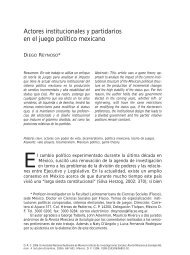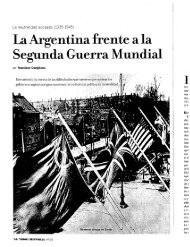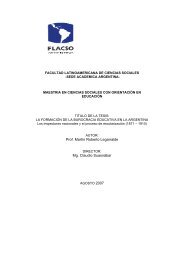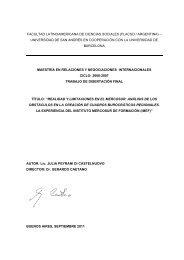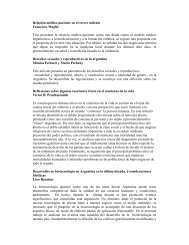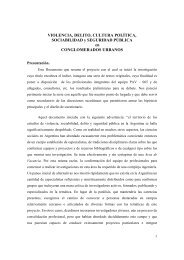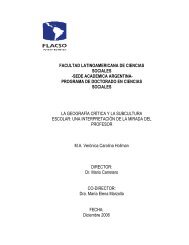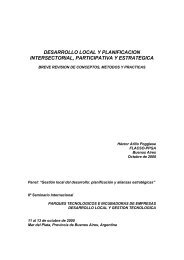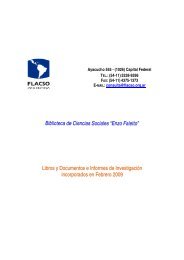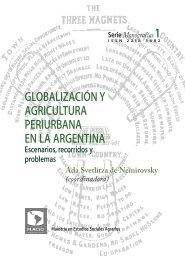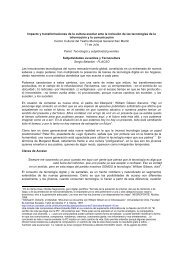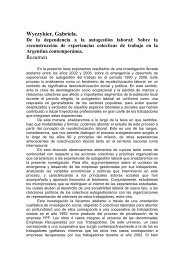Mercedes Botto Andrea Carla Bianculli - Flacso
Mercedes Botto Andrea Carla Bianculli - Flacso
Mercedes Botto Andrea Carla Bianculli - Flacso
You also want an ePaper? Increase the reach of your titles
YUMPU automatically turns print PDFs into web optimized ePapers that Google loves.
initial period of tariff preferences negotiation – 1985 to 1988 – and which was part of the<br />
Integration and Economic Program (PICE). The second episode, instead, is portrayed as a failed<br />
case: the negotiation of the Common External Tariff (CET) between 1991 and 1994, where in spite<br />
of the technical complexity of the issue at stake, research and knowledge did not have a prominent<br />
role in this particular decision-making process.<br />
The analysis of both episodes is intended to identify the type of knowledge produced, the<br />
articulation established with policymakers, and the factors that either promoted or hindered its use<br />
in the policy process. The information and data presented are based on secondary resources and the<br />
analysis of 18 interviews conducted with policymakers and researchers in the field of foreign trade,<br />
representing both private and public research centres, and who were directly involved in the<br />
process under Raúl Alfonsín’s (1983-1989) and/or Carlos Menem’s (1989-1999) administrations.<br />
This paper is structured into four parts. In the first one, we identify and analyze the literature<br />
contributions in terms of the conceptual and methodological definitions. The second section<br />
describes the spatial and temporal context in which the nexus between research and decisionmaking<br />
effectively occurred. In the third part, we delve into the analysis of both episodes of policy<br />
change and focus on the research-policy relationship. The fourth section offers a comparative<br />
analysis of the field research, and an initial impact evaluation – assessment. Finally, the conclusion<br />
presents the main lessons derived from both case studies, and proposes some policy<br />
recommendations regarding the enhancement of the utilization of empirical research by<br />
policymakers in the region in the years to come.<br />
1. LITERATURE REVIEW AND CONCEPT DEFINITION<br />
Interest in the role of ideas and academics on the decision-making process is not new. During the<br />
Post-war, interest arose as a consequence of the increasing complexity of decisions, the expansion<br />
of public intervention into new areas, and the greater significance of social sciences in the planning<br />
and evaluation phases of policies. Later on, other phenomena contributed to this<br />
acknowledgement, namely, the role of ideas in terms of the structuring and affirmation of<br />
paradigms of reference, and the development of the so-called public-private networks where expert<br />
knowledge is attributed a privileged role. In sum, the impact of ideas over the decision-making<br />
process has been strongly debated in the political and academic literature since the Post-war period<br />
till today.<br />
In terms of the impact or influence of research on public policy, two main paradigms can be<br />
identified regarding the role social researchers – taken as knowledge producers – play in the public<br />
decision-making processes [Brunner et al., 1993]. The first of these paradigms is part of the policymaking<br />
theory developed during the 1950s in the United States. This approach promotes a<br />
favourable attitude towards social and political engineering, and argues that researchers play a<br />
fundamental role within the decision-making process since they provide the necessary knowledge<br />
4



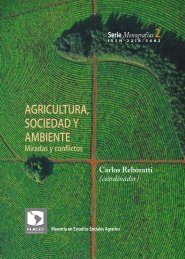
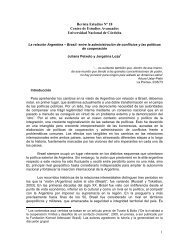
![[P] Disertacion.Melisa.Galvano.pdf - Flacso](https://img.yumpu.com/14596629/1/184x260/p-disertacionmelisagalvanopdf-flacso.jpg?quality=85)
